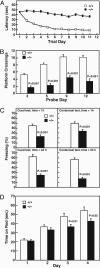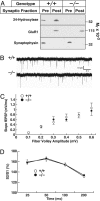Brain cholesterol turnover required for geranylgeraniol production and learning in mice
- PMID: 16505352
- PMCID: PMC1450160
- DOI: 10.1073/pnas.0600316103
Brain cholesterol turnover required for geranylgeraniol production and learning in mice
Abstract
The mevalonate pathway produces cholesterol and nonsterol isoprenoids, such as geranylgeraniol. In the brain, a fraction of cholesterol is metabolized in neurons by the enzyme cholesterol 24-hydroxylase, and this depletion activates the mevalonate pathway. Brains from mice lacking 24-hydroxylase excrete cholesterol more slowly, and the tissue compensates by suppressing the mevalonate pathway. Here we report that this suppression causes a defect in learning. 24-Hydroxylase knockout mice exhibit severe deficiencies in spatial, associative, and motor learning, and in hippocampal long-term potentiation (LTP). Acute treatment of wild-type hippocampal slices with an inhibitor of the mevalonate pathway (a statin) also impairs LTP. The effects of statin treatment and genetic elimination of 24-hydroxylase on LTP are reversed by a 20-min treatment with geranylgeraniol but not by cholesterol. We conclude that cholesterol turnover in brain activates the mevalonate pathway and that a constant production of geranylgeraniol in a small subset of neurons is required for LTP and learning.
Conflict of interest statement
Conflict of interest statement: No conflicts declared.
Figures






References
-
- Pfeffer S., Aivazian D. Nat. Rev. Mol. Cell Biol. 2004;5:886–896. - PubMed
-
- Brown M. S., Goldstein J. L. J. Lipid Res. 1980;21:505–517. - PubMed
-
- Goldstein J. L., Brown M. S. Nature. 1990;343:425–430. - PubMed
-
- Sever N., Song B.-L., Yabe D., Goldstein J. L., Brown M. S., DeBose-Boyd R. A. J. Biol. Chem. 2003;278:52479–52490. - PubMed
Publication types
MeSH terms
Substances
Grants and funding
LinkOut - more resources
Full Text Sources
Other Literature Sources
Medical
Molecular Biology Databases

